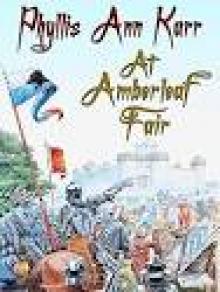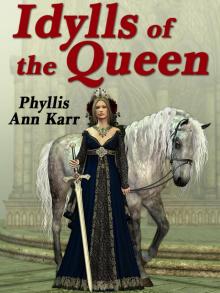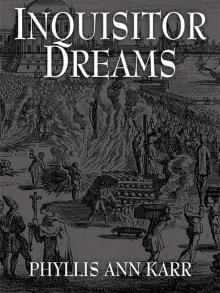- Home
- Phyllis Ann Karr
Inquisitor Dreams Page 10
Inquisitor Dreams Read online
Page 10
Already fires burn in Castile. It is already three years ago that flames licked high around the victims of Seville. Their screams rose to Heaven, mingling with the wails of that wretched, beautiful woman who betrayed them to their death. Their skins blackened and burst, their bones were broken and raked into the earth, and from their ashes rose the plague, God’s own judgment to scour the unhappy city that had watched them suffer. Its victims lay piled in every street, among them Fray Alonso de Hojeda, he whose preaching had sown the seeds of Inquisition in the proud and merciless heart of the Castilian queen. And yet, not reading aright these signs of the times, even as Heaven’s judgment abated, they raised their stakes once again and renewed their search for human fuel.
Like pestilence over the land, they have spread it into all parts of Castile. And now, not content, they would force it into our own country, our free and ancient Aragon, against all fueros, against even our own ancient inquisition! By license, as they claim, bought from the pope, they would replace the pope’s own inquisition with this new one of their own. Can this be the Will of God? That so-called holy child of Daroca, did it not prove that he was murdered this year just past by fellow Christians? Why, if not to fuel false fires of hatred and fear against unoffending but prosperous Jews? That night when the Christian mob hunted down one wretched and impoverished Moor, tearing him to pieces for daring to steal their golden pyx and consume the wafer they call the body of that Lord who Himself lived in poverty and preached mercy to all people and commanded that his flesh be eaten—what inflamed that mob, if not their monarchs’ cruel intolerance?
Fernando and Isabel are called pious and noble for seeking to purify their lands by depopulating them of so many good and useful subjects. But in truth, in thus impoverishing their lands, are these monarchs not looking to swell their own princely treasuries?
Already on this tenth day of May just past have his majesty’s inquisitors in Zaragoza, Fray Gaspar Juglar and Maestre Pedro Arbués, acting under the pious and benevolent blessing of the boy archbishop, their king’s young bastard, held their first solemn Act of Faith, penancing four unfortunates and robbing them, in Christ’s name, of their hard-earned property. This Act was held, these victims penanced, although no Edict of Grace had ever been read, no Term of Grace ever granted, not so much as a single fortnight expired since the appointing of the royal inquisitors! How much longer before Fray Gaspar and Maestre Pedro light their fires and begin burning victims to the greed of the boy bishop’s royal father?
Catalonia still holds out: having refused to send deputies to swear allegiance to the king’s sacrilegious inquisition this January past, our Catalan brothers cling to their own pope-appointed inquisitor of Barcelona. Our own Teruel holds out, shutting fast her gates against Fernando’s new inquisitors sent through his creature Fray Tomás, falsely called inquisitor general of Aragon as well as of Castile—forcing them into the unhappy town of Cella, fighting their excommunications and interdicts with counter-excommunications and counter-interdicts—as if it were man and not God who held all power of salvation or damnation!
Rise, Zaragoza! Follow brave Teruel! Rise, Aragon! Follow the examples of Catalonia and your own most noble Teruel!
Good Justicia, awake! Awake, and call your people of Aragon to arms:
CONTREFUERO!
Send forth the cry to keep Liberty alive!
* * * *
Almost immediately upon its appearance, rumors flew naming El Santon de Aragon as the author of this call to arms. The following morning, Friday the fourteenth day of May, the people of Calatayud’s nearest neighbors, Ateca and Daroca, awoke to find copies of this same broadsheet on the doors of their churches and public buildings, where they promptly flocked to read and hear it read for themselves.
The copy tacked to the great door of Daroca’s cathedral did not long remain in place. Before midday, the bishop having already perused it, his Ordinary sat studying it with Fra Guillaume in Daroca’s tiny and so far untouched tribunal of the ancient Papal Inquisition.
At length the old inquisitor raised his head with a heavy sigh. “I can find in it only the one heresy.”
“The one, however, is enough,” Don Felipe responded with reluctance.
“Enough…if the author is a baptized Christian. But I suspect, by these words, ‘they call,’ that he is not.” Fra Guillaume heaved another sigh, whether at the enormity of the heresy, or at its appearance in any statement directed against the new Inquisition, his companion could not have said.
“Proselytism?” the Ordinary guessed.
“How? See how immediately he follows it—whatever his own creed—with unimpeachable praise of our Lord? No, to read in this any attempt at turning Christians from their Credo would be to torture the words beyond measure. Our author actively preaches against two things only: the war in Granada and this new Inquisition. In both these areas he is free, so far as Holy Mother Church officially concerns herself in matters of the Faith, to win others to his way of thinking. Unless he is indeed baptized, we have no case.”
“Nevertheless, we have grounds for looking into this matter. And, my brother, we must do so. We owe it to the true Inquisition.”
“We do indeed.” Another sigh. “But where to begin?” The old inquisitor could have retired quietly into one of his Order’s houses long ago, and might perhaps be wishing in his heart that he had done so before this present storm broke over their heads, making retreat cowardly. As it was, with a strong arm to lean upon, Fra Guillaume stood willing to do his best throughout the crisis.
This strong arm Don Felipe was ready to provide, both for his bishop and for himself. Secretly, the young priest applauded El Santon for opposing the war in Karnattah. That war had, after all, cost him his entire family, good Catholics all, slain by mercenaries who could be Christian only in name.
Manuel Urtigo. He turned that name over and over in his heart every night. Or had done so until…Gamito had given him the mercenary’s name, and for the sake of Gamito and his people Felipe had himself committed sin and sacrilege that must be worse in the sight of God than even Manuel Urtigo’s murders. (Nor had he ever confessed this sin. In part, he feared that no confessor would grant him absolution; in part, it seemed monstrous so to use the same sacrament he had so grievously abused. Also—though he denied this thought whenever it leered like a demon out of the depths of his conscience—having himself broken the Seal of Confession, he had conceived a damnable distrust of his fellow priests, even to the point of wondering if Fray Bartomeu could possibly have come to him with young Pedro Choved’s confession knowing the bishop’s Ordinary to be a friend of the Jews and desiring him to break the Seal and bear the guilt.) Nevertheless, little more than a year later, he found that sometimes an entire day, sometimes even an entire night, could pass without thoughts of the probability of his own damnation, while the name of Manuel Urtigo still floated to his lips with evening prayers.
But, no matter what pride a country might take in her freedom of speech, there remained certain opinions less than prudent for certain lips to utter. Not only was Felipe de Granada a servant of Holy Church, he was also, now, an orphan, thrown back upon his benefice, his salary as bishop’s Ordinary, and such monies as remained with his Italian bankers. Seeing the necessity of a certain amount of worldly advancement, if only for the sake of his tender digestion and the soft bedding without which sleep would have been impossible, he chose to keep his opinions concerning their Majesties’ Holy War locked within his own heart.
Opposing the Royal Inquisition was another matter. His Reverence of Daroca himself, along with most bishops everywhere, opposed it. Having borne the earliest responsibility for judging heretics, bishops were by long tradition jealous of inquisitors. Hence the ruling that inquisitors could officially do nothing except in the presence of a bishop’s representative. At one time the inquisitors of Valencia had held unique permission from the archbishop of their city—Cardinal Borja, Don Felipe’s own patron, who was frying more important fis
h in Rome—to act without episcopal representatives; but already in 1481 Borja had seen the coming storm and revoked that rare privilege, requiring the Valencian inquisitors henceforth to do the very little that they did only with his own concurrence as granted through his episcopal vicar-general in Valencia. Borja being possibly the most powerful man in Rome after Pope Sixtus himself, Valencia had felt emboldened to keep the king’s new inquisitors barred outside the city gates since January—a circumstance that, had the author of the broadsheet known of it, he would surely have included along with his praise of Catalonia and Teruel.
Don Felipe spent the rest of that day and much of the night turning over plans for investigating this case, the best of which he discussed with Gubbio. Next morning, however, he found the problem solved for him when one Jaime González presented himself at the bishop’s house.
This Jaime González was a thin lad nearing eighteen, who had walked to Daroca from Calatayud, where he was apprenticed to Maestre Micer the printer. He had set out on Friday, slept along the way when benighted in a field, and, upon reaching Daroca, come straight to the bishop, not being sure where else to go or whom else to see. His master had decided already on Thursday to send him, soon after the first copies of the Contrefuero were discovered in Calatayud. Both Maestre Micer and Jaime believed the printer’s other apprentice to be El Santon de Aragon.
Don Felipe himself escorted Jaime to Fra Guillaume’s tribunal, where he told his story at greater length. His fellow apprentice, Juan Calamocha, a year or two the older, was a dark, serious, hard-working young man who would rather think alone than drink with friends. He laughed freely, but rarely, and then over ironies that his companions often failed to see until he explained them…and sometimes not even then. He had a ringing voice of middle pitch, as El Santon was said to have—although neither Jaime nor Maestre Micer had ever seen El Santon—and on this past Wednesday, waking early after his midday nap to hear his press in operation, the master printer had gone down into his shop to find Juan at work with a companion who kept his face in shadow or otherwise hidden. Juan had explained that he sought only to better his skills, that he had bought paper with his own money instead of spending it for drink or gaming, and that what he printed was a sheet of love sonnets which he hoped to sell secretly to amorous young men. When berated for showing a stranger the mysteries of printing, he had accepted his master’s rebuke in all meekness, but replied that he had already set his copy late the night before and shown his friend only as much as absolutely essential to provide the needed manual assistance, and that only after swearing him to secrecy. Next day the Contrefuero had appeared, and small irregularities in certain letters proved it to have come from Maestre Micer’s press.
“Juan Calamocha,” mused Don Felipe. “The name has a familiar sound to it.” But so much was only natural, Juan having been a favorite name from the days of the Apostles, and the town of Calamocha lying about as near Daroca to the south as Calatayud lay to the north.
In kindly tones, Fra Guillaume asked the lad, “And is your fellow apprentice a baptized Christian?”
“If not, your Reverence, I do not know it. He goes to Mass on Sundays and workdays too, and I have never seen him eat meat on Friday or Saturday.” After a moment’s thought, Jaime added, “But I have never seen him eat pork at all, nor take Communion, even at Easter.”
Fra Guillaume tapped the heretical passage in the Contrefuero and nodded. “It is past time, in any event, that we should make a visitation to Calatayud.”
Truth to tell, it was so many years past time for Fra Guillaume to make a round of inquisitorial visitations anywhere that more heads than one or two might have wondered whether the Daroca tribunal even enjoyed authority to make such visitations, were it not that Aragon’s old Papal Inquisition had probably never before been as popular as it was now. It had come suddenly to be understood as a kind of bulwark, however feeble, against the Royal Inquisition. Don Felipe had even heard the opinion that if Castile had only had its own Papal Inquisition from olden times, her queen could never have brought in this outrageous new one.
So far, Fray Tomás de Torquemada and the king’s other newly appointed inquisitors had left the Daroca tribunal alone in its obscurity and inactivity. Thus, Fra Guillaume still had comparative freedom of action. Now, in the twilight of his service in the world, with the bishop’s young Ordinary to assist him, he rose to the occasion with more energy, perhaps, than he had shown in half a century. As for Don Felipe, he had his secret conscience pricking him to offer what amends he could in the service of God and Holy Mother Church.
Between them, they were able to inspire their servants to make the necessary preparations with all dispatch. They set out at once after early Mass on Tuesday, the eighteenth of May, in a party of nine men—Fra Guillaume and his lay brother; Don Felipe, Gubbio, and a fresh-faced new Dominican scribe, Fray Pablo de María; the old former soldier Luis Albogado and three stout familiars—all mounted either on horses, asses, or good mules. Don Felipe rode the good little mule Castaña; she moved in a pleasant amble that left his stomach capable of holding the small feast with which the alcalde and other notables of Calatayud, forewarned first by Jaime González and next by the bishop’s messenger, welcomed the inquisitor and his retinue upon their arrival late in the day.
So eager was his Honor the alcalde to fight the Royal Inquisition by assisting the Papal, that he provided them space in the town hall, with lodging for the churchmen and Gubbio in his own house, for Luis and the familiars in houses of his personal friends. After taking Wednesday to settle into these temporary quarters, Fra Guillaume and Don Felipe were particularly scrupulous to have the Edict of Grace read aloud on Thursday at every Mass in every church of Calatayud. Thus they pointed their disapproval at Fernando’s new inquisitors, who had not had it read at all in Zaragoza, thereby rendering their Act of Faith on May the tenth, and the royal will that sanctioned it, of very questionable legality in proud Aragon.
Maestre Micer de Calatayud, the printer, who had actually appeared among the alcalde’s welcoming officials, but been told to wait with his case until the tribunal was settled to begin its holy work, presented himself promptly on Thursday morning—the words of the Edict must still have been fresh in the mouths of the priests in some churches. He repeated substantially the same account he had earlier sent through his younger apprentice, of how he had first discovered Juan Calamocha printing his sheet during siesta hour eight days ago, believed it to be mere love sonnets until its appearance on church doors next day, and then decided at once to send Jaime to the proper authorities in Daroca.
“Can you so much as guess at the identity of that young man whom your apprentice had assisting him?” asked Fra Guillaume.
Maestre Micer, a thin and bespectacled man past his half-century mark, with hair still thick but almost entirely gray, and a comfortable bulge at his middle bespeaking the good meals of prosperity, shook his head. “That one kept himself well in shadow. I thought no more harm of it than that he feared to be seen meddling in mysteries of a trade not his own. Perhaps he is a stranger to me, come from Ateca or another place. He may even be go-between for El Santon and my poor Juan.”
“We had thought,” Fra Guillaume observed, “that you suspected Juan Calamocha himself of being El Santon.”
The printer shrugged cautiously. “So indeed he may be. Or we could be mistaken. Who knows? But if El Santon is someone else, Juan may not have understood what he set into print. This happens to us, your Reverences. We come to see what we print only word by word, letter by letter.”
“I know very little of your mysteries,” Don Felipe put in, “but still it seems strange to me that he could do so much before you found him out. When he set his copy into print the night before, did you not glimpse his light? And where had he kept this paper purchased with his own money?”
“Juan has always been a good, quiet lad, one who works hard. Not like Jaime. Jaime…” Maestre Micer tapped his own forehead. “Jaime can muddle things
sometimes, but I had no one else to send to your Reverences. Juan, I never had reason to worry about until now. As for his paper…” Another shrug. “He must have kept it with my own store. Even now, I trust him to have kept our accounts in all honesty.”
“And you did not so much as glance at what he was printing, to see that it lacked the form and shape of sonnets?” Don Felipe persisted.
“It was still in my press, your Reverence. Hidden, you understand. And my eyes…” Maestre Micer removed his spectacles, held them up in one hand while blinking at the churchmen. “They are no longer sharp. I had no interest in young men’s sonnets, no cause to doubt my good apprentice Juan. I admit I was surprised that he should put his hand to such sonnets, but still his industry seemed to me in itself commendable. We must print what people will buy, not always what we ourselves would like to print. I have sometimes thought that this may be the reason we come to pay so little attention to the sense of the words taken all together.”
Fra Guillaume nodded. “Well, urge Juan Calamocha to come to us in his own person. Remind him of the Term of Grace. At present, even if he himself should be the author of this sheet, he may obtain pardon and mercy merely by confessing his guilt to us.”
When the master printer had left, Don Felipe observed to Fra Guillaume, speaking softly so as to exclude their new scribe from the council, “Maestre Micer knows, and has long known, more than he admits.”

 The Gallows in the Greenwood
The Gallows in the Greenwood At Amberleaf Fair
At Amberleaf Fair Frostflower and Thorn
Frostflower and Thorn The Fanciers & Realizers MEGAPACK
The Fanciers & Realizers MEGAPACK All But a Pleasure
All But a Pleasure The Idylls of the Queen
The Idylls of the Queen Frostflower and Windbourne (Frostflower & Thorn)
Frostflower and Windbourne (Frostflower & Thorn) Inquisitor Dreams
Inquisitor Dreams